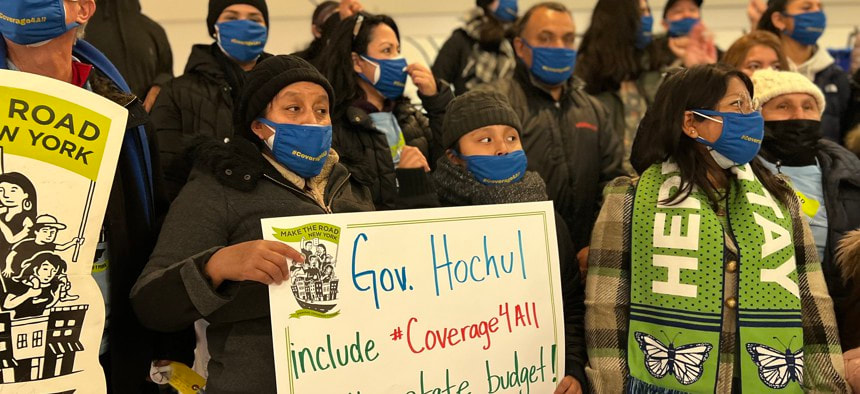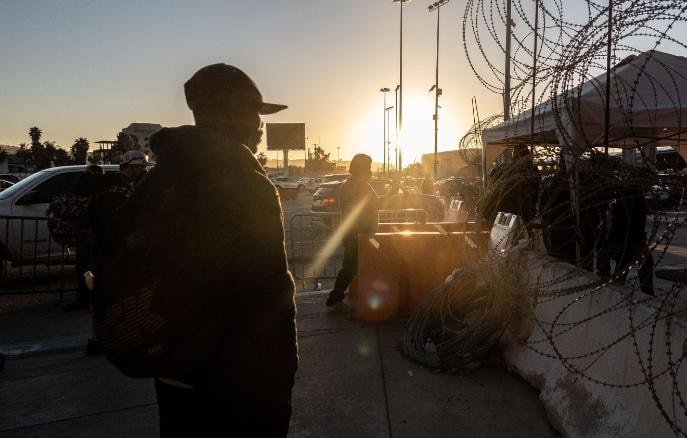Several politically powerful unions announced support of “Coverage for All” legislation to insure low-income New Yorkers without visas, green cards or citizenship. Source: City & State New York By REBECCA C. LEWIS
Continuing a trend of weighing in on budget proposals that are not strictly labor-related, several politically powerful unions have sent a letter to state leaders in support of legislation that would expand state-funded health care to undocumented New Yorkers. Legislative leaders included the proposal – called “Coverage for All” by proponents – in their nonbinding budget resolutions, but Gov. Kathy Hochul has not said whether she supports the measure. Influential unions including the health care workers’ union 1199SEIU, building service workers’ union 32BJ, the New York State Nurses Association, public employee union District Council 37 and the Retail, Wholesale and Department Store Union have all signed onto the letter addressed to Hochul, state Senate Majority Leader Andrea Stewart-Cousins and Assembly Speaker Carl Heastie. “As we saw during the height of the COVID-19 pandemic, immigrants, those with and without status, died at a higher rate than other marginalized and vulnerable communities,” reads the letter shared exclusively with City & State. “Our state's recovery must include all who call New York home.” Right now, the state offers health care to low-income New Yorkers who make too much to qualify for Medicaid but can’t afford private plans on the insurance marketplace. But the Essential Plan does not cover undocumented people, who also can’t qualify for Medicaid due to its federal funding, leaving a pool of uninsured New Yorkers estimated to number around 46,000. The legislation proposed in the two chambers’ one-house budget resolutions would remove the visa or green card requirement for noncitizens currently in place to access the state-funded health care. Although the letter was sent to all three state leaders, Hochul is the main target. “With the Legislature making it clear that Coverage for All is a priority, we urge Governor Hochul to show that these pandemic heroes are truly appreciated by providing them the opportunity to stay healthy, strong and safe,” Murad Awawdeh, executive director of the New York Immigration Coalition, said in a statement. In a statement sent to City & State earlier this month, Hochul spokesperson Avi Small said the governor is “committed to supporting New York’s immigrant communities and will review the legislation if it passes both houses.” In response to the new union support for inclusion in the budget, Small said Hochul looks forward to “continuing to work with the legislature to finalize a budget that serves all New Yorkers" Although labor unions always lobby strongly during budget negotiations, they have been notably vocal this year on issues that don’t directly pertain to specific member interests. In February, many of the same unions announced their support for the Clean Slate Act, which would seal New Yorkers’ felony records after a certain amount of time without additional convictions. Earlier this month, a similar group backed legislation referred to as “good cause eviction” that would give renters additional protections by placing limits on when a landlord can evict a tenant. Although union support does not guarantee “Coverage for All” or any other proposal will make it into the budget – “good cause,” for example, will almost certainly not make it in – their backing brings with it resources that small grassroots organizations don’t have at their disposal. The welcome boost will at the very least make sure that the issues are on the radar of state leaders as lobbying continues in Albany.
0 Comments
Source: CNN, By Priscilla Alvarez
Posted by the Tompkins County Workers' Center CNN)The Biden administration will soon release a federal regulation that overhauls the US asylum system to settle claims at a faster pace and help alleviate the immigration court backlog. The new rule gives asylum officers more authority by allowing them to hear and decide asylum claims — cases that are usually assigned to immigration judges — when migrants present at the US southern border. The regulation applies to migrants who are subject to expedited removal. Unaccompanied children are exempt. Administration officials have been alluding to the change in processing asylum claims for months. It comes as the administration is under mounting pressure from Democratic lawmakers and immigrant advocates to overhaul the US immigration system and amid concerns about a potential migrant surge. By shifting the adjudication of claims from immigration judges to asylum officers, officials hope cases will be completed in months, not years. There are 1.7 million cases pending in immigration court, according to Syracuse University’s Transactional Records Access Clearinghouse, which tracks immigration court data. “It will help reduce the burden on our immigration courts, protect the rights of those fleeing persecution and violence, and enable immigration judges to issue removal orders when appropriate,” said Attorney General Merrick Garland in a statement. Border authorities have been leaning on a public health authority, known as Title 42, to turn back migrants arrested at the US-Mexico border, barring some exceptions. Those who aren’t subject to the authority and are seeking asylum are then screened by asylum officers. If they pass the credible fear screening, their cases progress through the immigration court system. The new regulation could alleviate the backlog by allowing asylum officers to adjudicate claims, instead of immigration judges who are facing thousands of cases already. US Citizenship and Immigration Services — an agency under the Department of Homeland Security — oversees asylum processing. “It is an effort to deliver greater efficiency to the asylum process, while not compromising the due process that claimants have before them,” Homeland Security Secretary Alejandro Mayorkas told reporters last week, adding that implementation will be phased in, given resource constraints. The USCIS portion of the process, which includes the credible fear determination and a decision on the asylum claim, is still expected to take up to 90 days. The asylum seeker may be in detention or released depending on individual circumstances, officials told reporters Wednesday. If a case is denied, the individual may request review by an immigration judge under a streamlined process. The immigration judge is expected to issue a decision roughly 90 days after the proceedings begin, though continuances may also be requested, the officials added. The administration submitted the proposed version of the regulation last August and received more than 5,000 public comments. The final rule, which officials previewed Wednesday, will publish in the Federal Register in the “coming days” and likely take effect in the summer. The administration is still assessing who the rule will apply to and where it will be implemented, officials said, emphasizing that the rollout will start small. One of the challenges officials are likely to face is lack of sufficient resources given strained capacity at USCIS. Officials told reporters they’re bolstering staff to implement the rule when it takes effect but declined to say how many additional resources will be required. “Based on case volumes and capacity for both the existing workload and the new work resulting from this rule, USCIS has increased and plans to further increase the staffing and infrastructure to handle the full volume of work contemplated under the rule,” the USCIS official said. USCIS had previously estimated that it needed to hire around 800 new employees and spend about $180 million to implement the process for roughly 75,000 cases annually, according to text of the proposed regulation. Thursday’s announcement is the latest in a series of efforts to get through immigration cases. Last year, the Biden administration introduced plans to speed up court cases for recently arrived migrant families who are seeking asylum in select cities. President Joe Biden cited that effort in his State of the Union address earlier this month. “We’re putting in place dedicated immigration judges in a significant large number so families fleeing persecution and violence can have their cases heard faster and those who don’t legitimately hear can be sent back,” Biden said. Source: The Daily News by SCOTT DESMIT
Posted by Midstate Council for Occupational Safety and Health Fundraisers have been established for two men who were stabbed to death at the dairy farm where they worked in Alexander. Ivan Morales, 30, and Marcelino Gomez Hernandez, no age available, were found dead in a bunkhouse at Blumer Dairy Farm on Route 98 Friday night. Family and friends of the two men have set up GoFundMe accounts and will be collecting money at a Latin music night at the Brockport Elks Lodge on Saturday. Morales is from Comalapa, Chiapas, Mexico and collections are being taken to send his body home for burial. The stabbing happened late Friday night. Prince N.K. Wilson, 23, of Albion and Raul S. Cruz, 18, of Warsaw and formerly of Albion were arrested and charged with second-degree murder. Genesee County sheriff’s investigators have released few details in the case and have not released the names of the victims. District Attorney Kevin Finnell said the case is a difficult one, with multiple police agencies involved. To make a donation to the victims, go to gofundme and search “Help Marcelino RIP” and “Help Ivan’s Family in Mexico.” Ivan's Family's GoFundMe: bit.ly/3tI735G Marcelino's Family's GoFundMe: https://bit.ly/3uPK8Vt |
Archives
April 2022
Categories |





 RSS Feed
RSS Feed